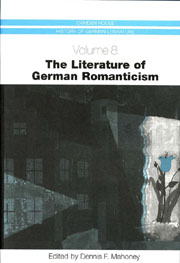Book contents
- Frontmatter
- Contents
- Illustrations
- Acknowledgments
- Abbreviations
- Introduction
- From “Romantick” To “Romantic”: The Genesis of German Romanticism in Late Eighteenth-Century Europe
- Goethe and the Romantic
- Early Romanticism
- From Goethe's Wilhelm Meister to anti-Meister Novels: The Romantic Novel between Tieck's William Lovell and Hoffmann's Kater Murr
- Tales of Wonder and Terror: Short Prose of the German Romantics
- The Romantic Drama: Tieck, Brentano, Arnim, Fouqué, and Eichendorff
- German Romantic Poetry in Theory and Practice: The Schlegel Brothers, Schelling, Tieck, Novalis, Eichendorff, Brentano, and Heine
- The Turn to History and the Volk: Brentano, Arnim, and the Grimm Brothers
- History and Moral Imperatives: The Contradictions of Political Romanticism
- Romanticism and Natural Science
- Gender Studies and Romanticism
- The Romantic Preoccupation with Musical Meaning
- Romanticism and the Visual Arts
- Goethe's Late Verse
- The Reception of German Romanticism in the Twentieth Century
- Works Cited
- Notes on the Contributors
- Index
Goethe's Late Verse
Published online by Cambridge University Press: 05 February 2013
- Frontmatter
- Contents
- Illustrations
- Acknowledgments
- Abbreviations
- Introduction
- From “Romantick” To “Romantic”: The Genesis of German Romanticism in Late Eighteenth-Century Europe
- Goethe and the Romantic
- Early Romanticism
- From Goethe's Wilhelm Meister to anti-Meister Novels: The Romantic Novel between Tieck's William Lovell and Hoffmann's Kater Murr
- Tales of Wonder and Terror: Short Prose of the German Romantics
- The Romantic Drama: Tieck, Brentano, Arnim, Fouqué, and Eichendorff
- German Romantic Poetry in Theory and Practice: The Schlegel Brothers, Schelling, Tieck, Novalis, Eichendorff, Brentano, and Heine
- The Turn to History and the Volk: Brentano, Arnim, and the Grimm Brothers
- History and Moral Imperatives: The Contradictions of Political Romanticism
- Romanticism and Natural Science
- Gender Studies and Romanticism
- The Romantic Preoccupation with Musical Meaning
- Romanticism and the Visual Arts
- Goethe's Late Verse
- The Reception of German Romanticism in the Twentieth Century
- Works Cited
- Notes on the Contributors
- Index
Summary
In a typically self-ironic poem in the West-östlicher Divan (West-Eastern Divan, 1819) Goethe lists the losses old age brings to everyone before defiantly asserting that two things remain to him, making life worthwhile: “Mir bleibt genug! Es bleibt Idee und Liebe!” This binary pairing of intellect and feeling lies at the heart of Goethe's “symbolic” outlook on old age. As Ernst Cassirer (1874–1945) authoritatively demonstrated, Goethe's theory of symbolism covers both those “symbolic forms” on which a poet draws — as raw material, from traditional poetic meters through genres to concepts (in its broadest sense, “ideas”) — and what he makes of them to create a new, aesthetic structure of renewed significance, of “symbolic pregnance,” as Cassirer calls it (in other words, “felt experience,” at its most intense in “love”). And, as Rudolf Arnheim has argued in respect of Goethe, as well as Titian, Rembrandt, Beethoven, Cézanne, and Rodin, such a synthetic blending of mind and emotion is the defining characteristic of the “late style” found “in the end products of artists' long careers.” The notion of “lateness” in the work of an artist now occupies an important position in the history of criticism, and given the length of his life, and the historical and cultural periods it covers, it is not surprising that the category has been applied to Goethe's works. Erich Trunz's assessment that Goethe's Alterswerk began in 1809 when he started to write his autobiography has gained widespread support.
- Type
- Chapter
- Information
- The Literature of German Romanticism , pp. 307 - 326Publisher: Boydell & BrewerPrint publication year: 2003

